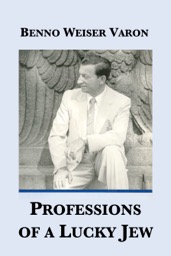 $9.99 on Kindle
$9.99 on KindleProfessions of a Lucky Jew by Benno Weiser Varon (201,000 words and 47 photographs)
In 1932, Benno Weiser was studying medicine in Vienna. During a brawl he rescued a fellow Jewish student by cracking the skull of a huge Nazi with two outsized metal keys, while some thirty Nazis watched. He considers this event his rite of passage — proving to himself that “Jews are no cowards.” Life would give him many an opportunity to prove it again.
A Jewish Rambo? Not at all. Fellow Viennese remember him for making them laugh. He wrote, directed, and performed in literary cabarets. “All I could take along from Nazi Vienna,” writes Weiser Varon, “was my accent.” But he also exported his fighting spirit. As Ecuador’s first syndicated columnist, blending drama with satire, he dispensed faith to those who rooted for the Allies and heartburn to the powerful Nazi colony. The Axis powers sponsored seven weeklies to counteract his influence, there was an interpellation in parliament, a “promise” by the minister of the interior to shut him up, an op-ed duel with a Vichy diplomat. The New York Times, reporting on his struggle, called him one of Latin America’s best known columnists.
In 1946 the World Zionist Organization drafted him into its campaign to convince the nations of Latin America of the justice of the Jewish fight for statehood. Varon’s niche in history is the U.N. Palestine Partition Resolution of 1947: with a colleague, he is credited for getting the decisive Latin American “yes” votes. In 1964 Golda Meir appointed him ambassador to a succession of Latin American countries. In 1970 Varon survived an assassination attempt by Palestinian terrorists in Asunción. In 1972 he retired from diplomacy, returned to journalism and started teaching at Boston University.
Varon met Albert Einstein and Aleksandr Kerensky as well as the Who’s Who of Latin-American writers, painters, intellectuals, and statesmen such as Perón, Castro, the Somozas, Stroessner. He also placed second-best in a joke contest with Bob Hope and, together with his actress-wife, wrote a play, “A Letter to the Times,” which was produced in English and in Spanish.
In this autobiography by a lifelong Zionist, many of Weiser Varon’s experiences as an émigré, a Jew or a diplomat — recounted with the wit of an entertainer — sound more like fiction than real life.



